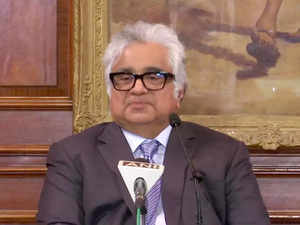
NEW DELHI: The government is well within its rights to waive penalty and interest on dues that telecom companies owe following the Supreme Court ruling on the definition of adjusted gross revenue (AGR), senior advocate Harish Salve said in a legal opinion to Bharti Airtel.
If the government is of the view that burdening the telcos with immediate recovery of arrears will result in impairing their operations and that a larger public interest will be served by revisiting the the imposition of penalty and high interest rates, “there is nothing in the judgment of the Supreme Court that would prevent the government from acting appropriately”, Salve said in his legal opinion which has been annexed in an Airtel letter to communications and IT minister Ravi Shankar Prasad, also marked to finance minister Nirmala Sitharaman.
He said the government could also allow more time for payment of the principal amount of the shortfall.Salve’s legal opinion on the SC order that backed the government stand on including non-core items of revenue while computing AGR, were cited by Bharti Airtel in the November 18 letter, a copy of which was also marked to principal secretary to the PM, PK Mishra, and cabinet secretary Rajiv Gauba. Gauba is heading a panel of top officials set up to suggest ways to restore the sector’s health.
Salve added that Bharti Airtel would be “well advised” to approach the government to make out case to revisit the imposition of penalty in the larger grounds of public interest.
Referring to the inclusion of components such as trade discounts, discounts on prepaid tariffs and forex fluctuations in the computation of AGR, Salve in his legal opinion said that in the past, the telecom tribunal headed by a retired judge had held that the demands of the government were “illegal”. He added that the tribunal examined 13 heads of income and held that most of them could not be included in AGR.The legal opinion of retired Supreme Court judge, Justice AK Sikri, were also annexed in Airtel’s letter to the government.

Sikri backed Salve’s legal opinion and was cited in the letter as saying, “This would demonstrate that the dispute raised by the TSPs (telecom service providers) was not frivolous. It cannot be said that the view of the Supreme Court in this case is the only possible view or that the view of the tribunal is totally absurd. In my view, no case for penalty was made out.”
Airtel and Vodafone Idea, the telcos worst affected by the order, are expected to file review petitions this week. They have appealed to the government for relief.
Airtel faces licence fee, spectrum usage charge, interest and penalty dues of over Rs 41,000 crore and has sought a waiver of penalty and interest, which together contribute to almost 75% of its estimated liabilities.
Airtel also wants interest to be levied only from the date of the AGR judgment and a 16-year payment period for the dues after a moratorium of two years. It said if interest must be levied, it must be at rates of of government securities plus a small spread, say 1%, to compensate the government for notional loss of interest. It has even proposed keeping SUC outside the ambit of the demands because it was not part of the SC order.
It said companies such as Power Grid Corporation of India, GAIL and RailTel, which possess telecom licences to offer internet and national long-distance services, should be treated at par with telcos. According to Airtel’s estimates, these non-telecom companies would be liable to pay the government close to Rs2.27 lakh crore in dues after the SC’s order.
The company said failure to provide relief would allow for a “possible bankruptcy” of licensee companies and the loss of millions of direct and indirect jobs. It also predicted there would be bad loans for Indian banks running into a few lakh crore rupees and a ripple effect on vendors, retailers, kirana shops and related services like advertising and transportation, which could again lead to the collapse of more companies.
No comments:
Post a Comment